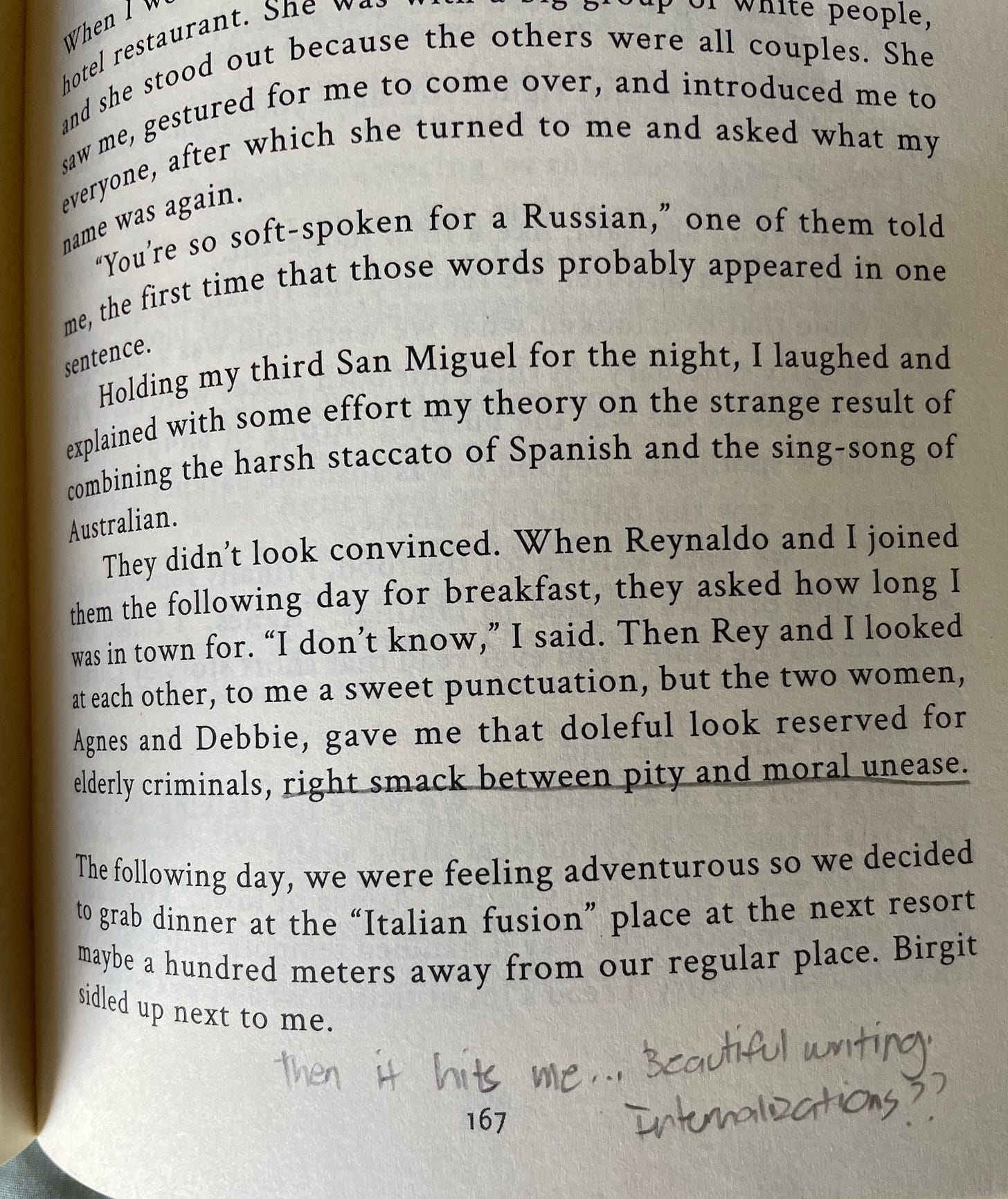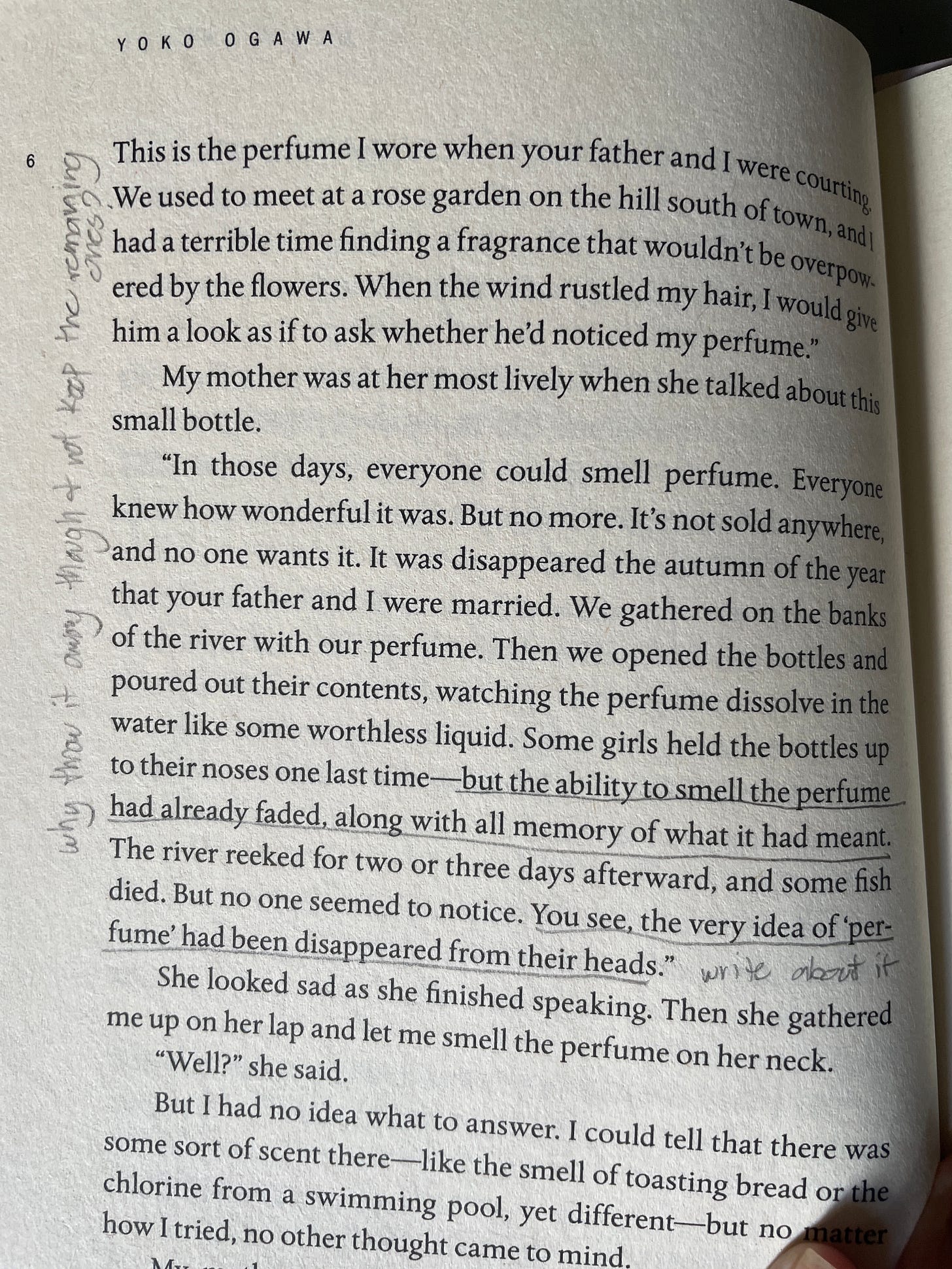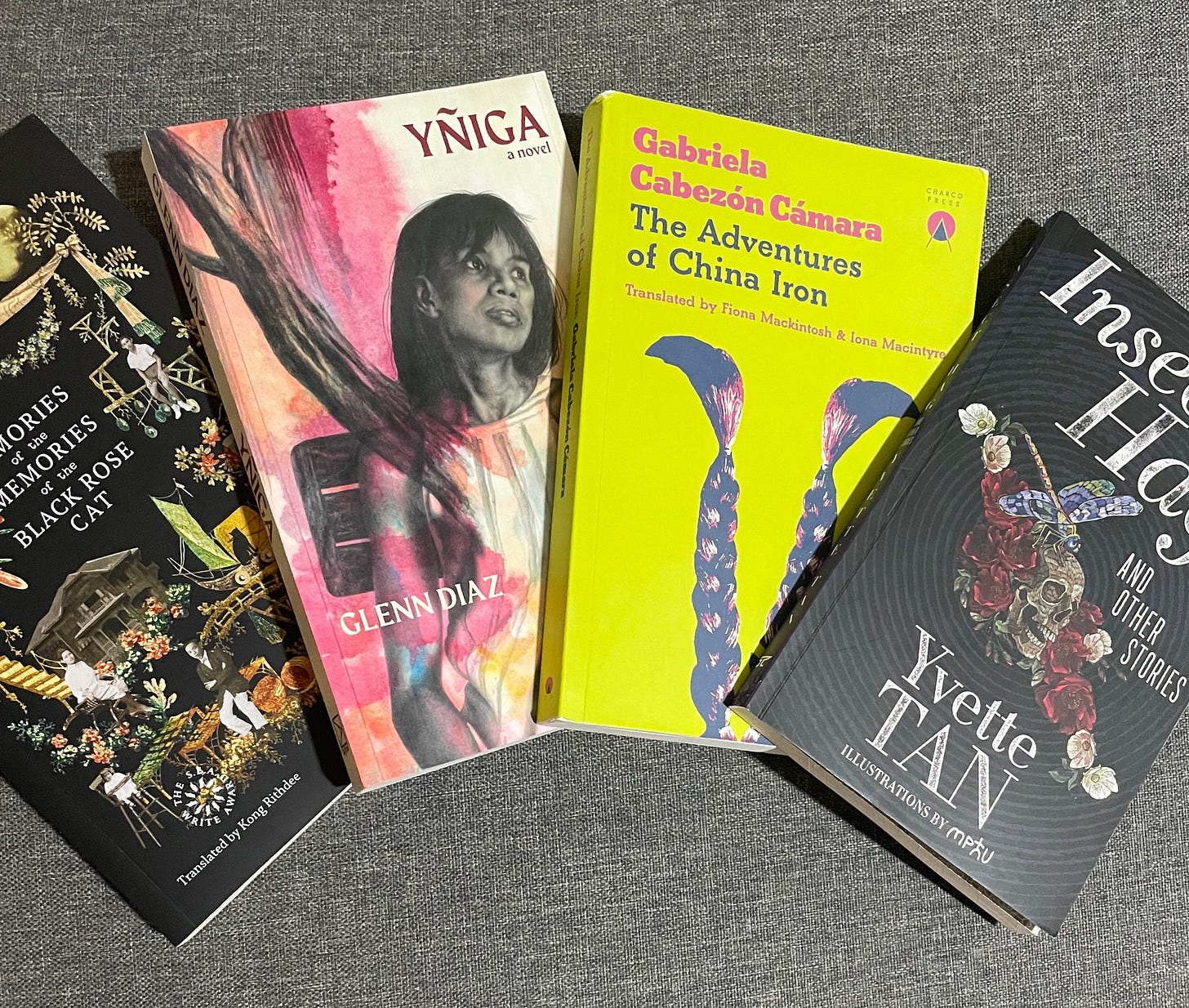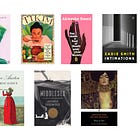April reading wrap-up 📚
where I read whimsy, surreal, dystopian-y books
Hi Friends!
Last Sunday, I was supposed to go to my first ever book club in-person meeting. Sadly, I got the dates wrong. The meeting took place on Saturday instead of Sunday. I was already dressed up and ready to go when I decided to check the announcement post again before leaving. And it was there I saw that it was supposed to be on Saturday. I don’t know why I kept thinking it was on Sunday. I was so excited to attend and had traded up an indie bookshop event for this that started an hour earlier. But anyway..
Everything I Read in April
I read 7 books in April. Surprisingly, a common theme among some of these books are whimsy, fantasy, dystopian-y. Another theme was something akin to, or almost the same as love, but not really. Infatuation maybe? You’ll see when you get to the books I’m talking about. Also, half of the books I read in April were set in mysterious islands. I don’t know what’s up with that.
The Quiet Ones by Glenn Diaz
A group of call center agents find a way to embezzle money from the American company they work for. Because what is a few million dollars to a large national telco company right? The group eventually quit their jobs after securing a large amount of money. However, one month after quitting, one of them receives a call at 4 am in the morning saying that the police are on their way.
The heist-thriller plot though is barely the point of the book. It's more about the the silent lives of Manila's inhabitants - outsourced call center agents. A sub-group in this third-world country. A product of globalization and the rise of call centers. We see the characters go through the routines of their soul-sapping job, the draining Manila commute, and the financial problems they have living in a poor country. The Quiet Ones is meditative to read. It speaks about loneliness and placelessness one can get in this modern world. I could get lost in Diaz's prose. It's a book that's more about interpreting what’s in between the words. It’s a story that lingers with you long after you've read it.
I loved reading about the lives of call center agents. Their routines were familiar to me because once upon a time, I worked for Business Process Outsourcing (BPO) company. But didn't we all? Millennial Filipinos, at least. I hate going to Manila but reading a place I've been to and experienced a thousand of times makes me smile. I laughed at the truth behind Manila's horrible traffic and the effects of American colonialism.
If you want to learn more about call center culture or what its like living in Manila, this is the book for you.
The Iguana by Anna Maria Ortese and translated by Henry Martin
A Milanese count discovers an uncharted island off the coast of Portugal and its strange inhabitants. The group of inhabitants is composed of a Marquis, his two brothers, and their Iguana servant. The count spends the night in the island called Ocaña and gets to know his host and the strange, crumbling house they live in. During the night strange things happens. But the strangest of all, is that the count eventually falls in love with the iguana and hatches a plan to free her. Can the count really fall in love with an iguana? Or was it just pity? Was she really an iguana?
Let me preface this short review by saying this is a magical realism book. The whole time I was reading this I felt like I was in a fever dream. Strange, unexplainable things happen in the story. I was scratching my head all the time. While there were a lot of things going on in this slim book, I never really knew what it was all about. Twice in the book the narrators tells us to "not worry much about the plot", so I'm like okay, and just continued reading. However, I didn't really got the core of what this book was about. But was "getting" the book really the intention of the author? I don't know. I kept recalling how this book came to my radar but I can't recall what lead me to this book. I don't see The Iguana on social media at all. Hey little book, why did you suddenly pop in my TBR?
Naturally, I went to Reddit to learn more about this unexplainable book after reading it. A lot of people likened this to The Tempest by Shakespeare but I didn't get the reference since I hadn't read The Tempest yet. I ended up learning more about the author instead. Anna Maria Ortese is a well-known Italian author who won several prestigious literary awards in Italy but it was only after her death that she received international recognition and praise. Although only few of her works are translated to English ( a few of which are translated by Ann Goldstein), she remains to be one of the Italian greats.
The Iguana is funny with criticisms of capitalism and Italian society. There's also a sadness that permeates within the book as we see the iguana being maltreated by her masters and hoping that her lover will love her back. While this was a strange book, I enjoyed being lead to various unbelievable scenarios. I kept reading it even though I had zero idea where these all were leading to. Never once did I wanted to give up because I just had to know how will this end. If you want a strange, pointless but enjoyable read, then pick this book up. To anybody who has read this book, what did you think about it?
White Nights by Fyodor Dostoevsky
White Nights is a short story about loneliness. It’s a sad story about a man who’s (questionably) fallen in love but only achieves brief happiness with his love. Over the course of four nights, through their nightly walks, a man and a woman meet and come to know each other. By the end of the fourth night, the man, our unnamed narrator, declares his love for Nastenka. Although, I doubt he was truly ever in love. I feel like he was only in love with the idea of a romantic relationship brought about by loneliness.
The story opens with a beautiful sentence full of hope. I love it. It made me instantly day-dream.
It was a wonderful night, the kind of night, dear reader, which is only possible when are young.
Plot-wise, the plot of this short story is nothing new. But I found Dostoevsky’s writing to be full of feelings. He writes about vulnerability, heartbreak, and loneliness. When the story started, I was thinking how delusional and desperate our narrator is. But by the end of the story, our narrator's quiet acceptance of his loss won me over.
I love the stream of consciousness narration of people watching during our protagonist’s nightly walks. I love taking walks myself and I also make up stories about the people I encounter during these walks — much like our protagonist.
The Penguin Little Black Classics edition, which I had, also had another short story from Dostoevsky, entitled Bobok. Bobok tells the story of a young man who overhears a conversation between ghosts who were once prominent people in Russian society. I didn't get much of this story but I understood it was a satire about said people.
The Vegetarian by Han Kang and translated by Deborah Smith
The Vegetarian is a story about Yeong-hye, a part-time graphic artist and homemaker, who decides to stop eating meat after a dream. Her decision to stop eating meat eventually leads to devastating consequences in her personal and family life. The Vegetarian is a unique story detailing a woman's descent to madness and society's unacceptance of people who wish to live differently.
The book is divided into three parts with Part 1 narrated by Yeong-hye's husband, Part 2 by her brother-in-law, and Part 3 by her sister. Our main character has no voice in this book, aside from the little snippets of her dream, which I think was a wonderful device to establish that we only see Yeong-hye how these three people see her. We see the way her husband only see her as a homemaker or his brother-in law only seeing her as an object to satisfy his sexual and artistic desires. This made me think of South Korea's big misogyny problem and made a mental note to add Kim Ji-young, Born 1982 and Apartment Women to my TBR which tackles similar themes. But to be fair, Kang states that the misogyny problem she writes about in The Vegetarian is not only prevalent in South Korea but in other parts of the world as well. Yeong-hye's decision to stop eating meat was her first step towards taking agency for her life. Her act of rebellion against a conventional, patriarchal society.
Yeong-hye clearly has mental health problems but nobody is trying to help her. Her own husband doesn't understand her and her brother-in-law only desires her body. Her sister loves and protects her but not the way Yeong-hye needs. Nobody wants to look what's underneath. Growing up with a violent father, being objectified, enduring society's ridicule over her choices — all these contributed to her poor state of mental health.
While the book held an interesting start, the middle parts had me wondering where the author was going with this. While the novel progresses, I had a feeling I wasn't going to like the book. I know by the way I would engage a book and that means, lesser passage underlined and few marginalia on the pages. Even now I'm not sure if I like this book or not. I was uncomfortable the whole time I was reading it. But it definitely made an impression.
The Memory Police by Yoko Ogawa
In an unnamed island, things start disappearing. Birds, calendars, roses, and even novels. Once a thing "was disappeared", citizens throw any remnants of the object into the river, else, The Memory Police sees to it. Eventually, all the people in the island collectively forget the existence of said thing, along with the memories they've attached to the thing. Because objects keep disappearing, food is scarce and infrastructure is crumbling. The island eventually becomes one of those post-apocalyptic towns where civilization collapsed.
There are still some people who continue to remember things but are captured and persecuted by the Memory Police. One of these people are the narrator's mother and her editor, R. R reveals himself to be one of those who still remembers the disappeared objects, and fears that he will be taken by the Memory Police soon. Our narrator, with the help of an old man, a family friend, hides R in a secret room in her house. While in hiding, R tries to help the narrator and the old man to remember some of the long disappeared objects, though to no avail. In a way, R tries to save them both as well by encouraging them to remember and patching the holes in their hearts left by the disappeared objects.
In terms of plot, The Memory Police is a dystopian novel that's a mix of 1984 in terms of the use of propaganda, doublethink, and complicity and of One Hundred Years of Solitude in terms of memory loss. The Memory Police is a quiet dystopian novel where nothing is revealed as to how society got to this point. There's no strong-willed revolutionary who fought against the system. Instead, Ogawa tells us how people can easily accept the changes happening around them, how we can easily slip into authoritarian regimes, be complicit into our own oppression, and, in the end, resign to our fates. At first, I was thinking, why do these people just complicitly agree to throw the objects away? Why does nobody write about it? But I guess that was Ogawa’s point.
Ogawa's writing, though simplistic, is heavy with quiet longing as we realize that objects are more than just objects but they're also symbols of personal memories and passed-on knowledge.
The Invention of Morel by Adolfo Bioy Casares and translated by Ruth L.C. Simms
A fugitive escapes to an uninhabited island (yes, another book set on a mysterious island) rumored to be enchanted or riddled with plague. Every day we read about the fugitive, a man, trying to survive on the island — foraging food, keeping the tides at bay, making sure he has shelter, and all that stuff. One day, he sees a group of people living in one of the structures on the island. Among the group of people is a woman who comes down to the shore to see the sun set every afternoon. Our narrator eventually falls in love with the woman called Faustine and resolves to introduce himself to her one afternoon. However, Faustine doesn't seem to see or hear him even though he has done everything that's to be done for somebody to notice another human being. What is going on? Is something magical at play here? Or has the police finally caught on the fugitive and is trying to play a prank on him?
It's hard to write anything about Morel without spoiling much. The early pages reminds me a lot of Piranesi where both narrators are preoccupied with the day-to-day life of surviving. This book was my local book club's pick and I was so excited to discuss theories with other people. But well, the book club didn't happen. I didn't find this particularly good upon finishing it but when my husband requested to tell him what the book was about, I realized how well-written the book was. It was a perfectly plotted suspense of a book. The slow reveal and the pacing was just right. As I was telling the story, I remember how Casares gives a heart-breaking exploration of longing, loneliness, and immortality in the guise of a sci-fi/fantasy plot. The brilliance of the book was a slow reveal.
Casares also deals with the morality of an invention, of technology. I told my husband that this book felt like a Black Mirror episode and he was amazed that this was written in 1940.
I'd argue that our narrator wasn't really in love with Faustine. How can you fall in love with somebody whom you've never had a two-way communication with? Again, I am saying this through the lens of a modern woman. But you can feel your heart break for our narrator as we read his frustration on his one-sided love affair with Faustine. Even if said "love" was just an idea of a person rather than an actual person.
Dwelling by Emily Hunt Kivel (out on August 2025)
Dwelling is a story of a woman trying to find her place in this world, both literally and figuratively. It's a surrealist fairytale retelling in a world where our economic future is not looking good.
Our protagonist, Evie, is evicted from her home and city in the midst of a housing crisis in New York. Without parents or friends and a sister living in a mental institution, Evie has nobody to turn to. Except, she remembers a distant cousin living in Gulluck, Texas. And so, Evie sets out in search of a home. There she meets ancient creatures, a secret society, and more weird and magical people.
The book starts really great. The New York in Evie's world faces mass evictions caused by the city's deal with the world's leading rental vacation company. Incentives are given to landlords to renovate and eviction restrictions and regulations are lifted. In the end, the renters were not able to cope with this changes and a lot of people like Evie became homeless. Only property owners were able to stay in the city.
In Part 1, we read about New York looking like a deserted city after an apocalypse because of the mass migration, looting, and abandoned personal things on the streets. This vision of New York is not impossible. It maybe even happening now and in other parts of the world. There's a dialogue in the middle of the book where Terry, the distant cousin says, that her son thinks that his parent's generation maybe the last generation to own property. And so, he is trying to be good to his parents so that they will allow him to live in their home forever. Reading this made me sad because I know this is already happening. Andrew, the son, is anxious about being able to create a sense of place in his future. He is scared of the bleak economic future that's slowly dawning on him, on us too, here, in real life.
Part 2 is the core of the story. We see Evie transform from a passive worker and disengaged member of society to a person who takes control and builds her life.
Part 3 was weird. It felt like two different plots pasted into one book. Dwelling started with an almost dystopian plot but ended up being a fairy tale retelling. I am not quite sure yet if this worked well. Despite that, this book was a joy to read.
Thanks Farrar, Straus and Giroux for the ARC!
Have you read any of the books I mentioned above? If yes, let me know which ones and if you liked them.
What I Want to Read in May
Other May TBR not in the picture is Ali and Nino by Kurban Said and Checkout 19 by Claire-Louise Bennett.
Previous monthly wrap-ups
Seems like I’ve been writing lengthier monthly wrap-ups since the year started. When I started this publication, I’ve published weekly individual book reviews. I’m thinking of starting that back again. Do you guys prefer these wrap-ups or individual book reviews? Your feedback will help me a lot.
Everything in this newsletter is free for now. And so, every open, like, comment, or restack means a lot to me and I thank you all for your support. If you’d like to further support me, buy me a coffee so that I can continue this work.
Thanks again for reading and remember, folks, to read books out of the social media algorithm!










i definitely know what you mean about coming away from The Vegetarian not knowing if you *liked* it but it having made an impression... I always recommend Human Acts first for those who want to read Han Kang! We Do Not Part was also lovely... and haunting.. I'm excited for her new book, too, 빛과 실, to be translated :)
omg i read the invention of morel last month too!! so good and totally agree with your take— i was skeptical at one point that Casares wasn’t going to be able to land the plane, but boy did he nail it. Such a smart, painful read.